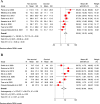Pertussis infection in critically ill infants: meta-analysis and validation of a mortality score
- PMID: 39930478
- PMCID: PMC11808955
- DOI: 10.1186/s13054-025-05300-2
Pertussis infection in critically ill infants: meta-analysis and validation of a mortality score
Abstract
Background: Despite widespread vaccination programs, pertussis continues circulating within populations and remains a life-threatening infection in infants. While several mortality risk factors have been described, a comprehensive synthesis is lacking. We conducted a meta-analysis of studies investigating mortality risk factors in Pertussis infections and validated those factors in a large cohort.
Methods: Observational studies published in English were systematically searched in PubMed, EMBASE, and LiSSa databases from 01/2000 to 06/2024. The search yielded 816 unique citations. The primary outcome was mortality before discharge from the Pediatric Intensive Care Unit (PICU). Two independent reviewers assessed the risk of bias and extracted data. A REML-random effect model was used to calculate pooled prevalence and conduct the analysis. The identified risk factors were subsequently evaluated in a monocentric cohort of patients admitted to a tertiary hospital's PICU for severe pertussis between January 1996 and December 2020. Data analysis was conducted between June and August 2024.
Results: Seventeen studies, including 2,725 patients, met the inclusion criteria. The pooled prevalence of mechanical ventilation, continuous renal replacement therapy, and Extracorporeal Membrane Oxygenation support were 55% (95% CI: 40-70; I2 = 98), 15% (95% CI: 3-27; I2 = 95), and 8% (95% CI: 3-12; I2 = 93), respectively. The pooled mortality incidence was 19% (95% CI:12-26; I2 = 96). Identified mortality risk factors included elevated heart rate, presence of pulmonary hypertension, presence of seizures, and elevated white blood cell (WBC) count. Validation in an 83-patient cohort (median age: 45 days, IQR: 30-55) revealed a mortality rate of 12%. Risk factors identified in the meta-analysis were significantly associated with non-survival in the cohort. A mortality prediction score was developed incorporating age < 30 days, heart rate > 200/min, and WBC > 30 G/l, achieving an area under the curve of 0.92 (95% CI: 0.86-0.99).
Conclusion: This meta-analysis identified a simple yet effective score to assess the severity of pertussis infection in infants admitted to PICU. Accurate risk stratification may enable timely treatment of critically ill patients, potentially improving outcomes.
Trial registration: The study protocol was registered on PROSPERO: CRD42024582057.
Keywords: Bordetella pertussis; Malignant pertussis; Metanalysis; Mortality.
© 2025. The Author(s).
Conflict of interest statement
Declarations. Ethics approval and consent to participate: The study was approved by the ethical committee from the French Society of Intensive Care (CE SRLF 23–074). The study has been registered at the “Commission Nationale de l’Informatique et des Libertés” corresponding to the reference methodology (MR-004). The data was processed following European legislation. A note informed patients and their families in the welcome booklet that their child’s clinical data could be collected for research purposes and of their right to decline such research. Competing interests: The authors declare no competing interests.
Figures




References
-
- Cherry JD, Paddock CD. Pathogenesis and histopathology of pertussis: implications for immunization. Expert Rev Vaccines. 2014;13(9):1115–23. - PubMed
-
- Tubiana S, Belchior E, Guillot S, Guiso N, Levy-Bruhl D, Renacoq P. Monitoring the impact of vaccination on pertussis in infants using an active hospital-based pediatric surveillance network: results from 17 years’ experience, 1996–2012, France. Pediatr Infect Dis J. 2015;34(8):814–20. - PubMed
-
- Yeung KHT, Duclos P, Nelson EAS, Hutubessy RCW. An update of the global burden of pertussis in children younger than 5 years: a modelling study. Lancet Infect Dis. 2017;17(9):974–80. - PubMed
Publication types
MeSH terms
LinkOut - more resources
Full Text Sources
Medical
Miscellaneous

